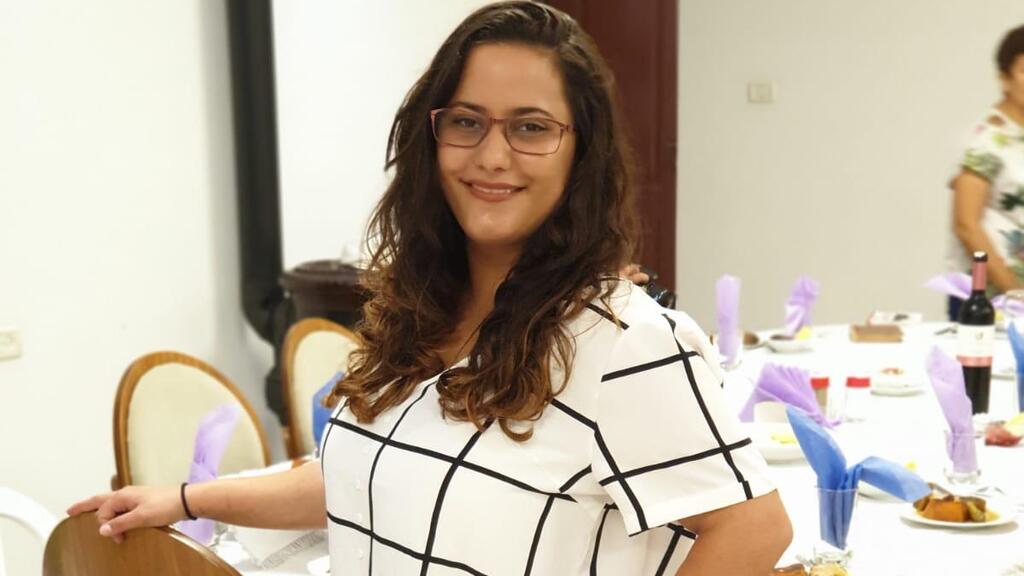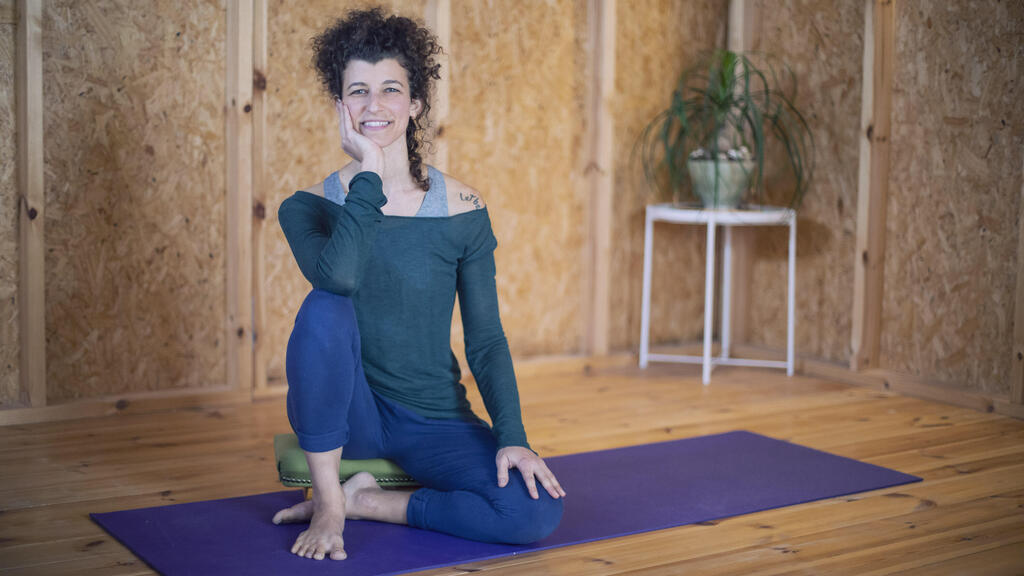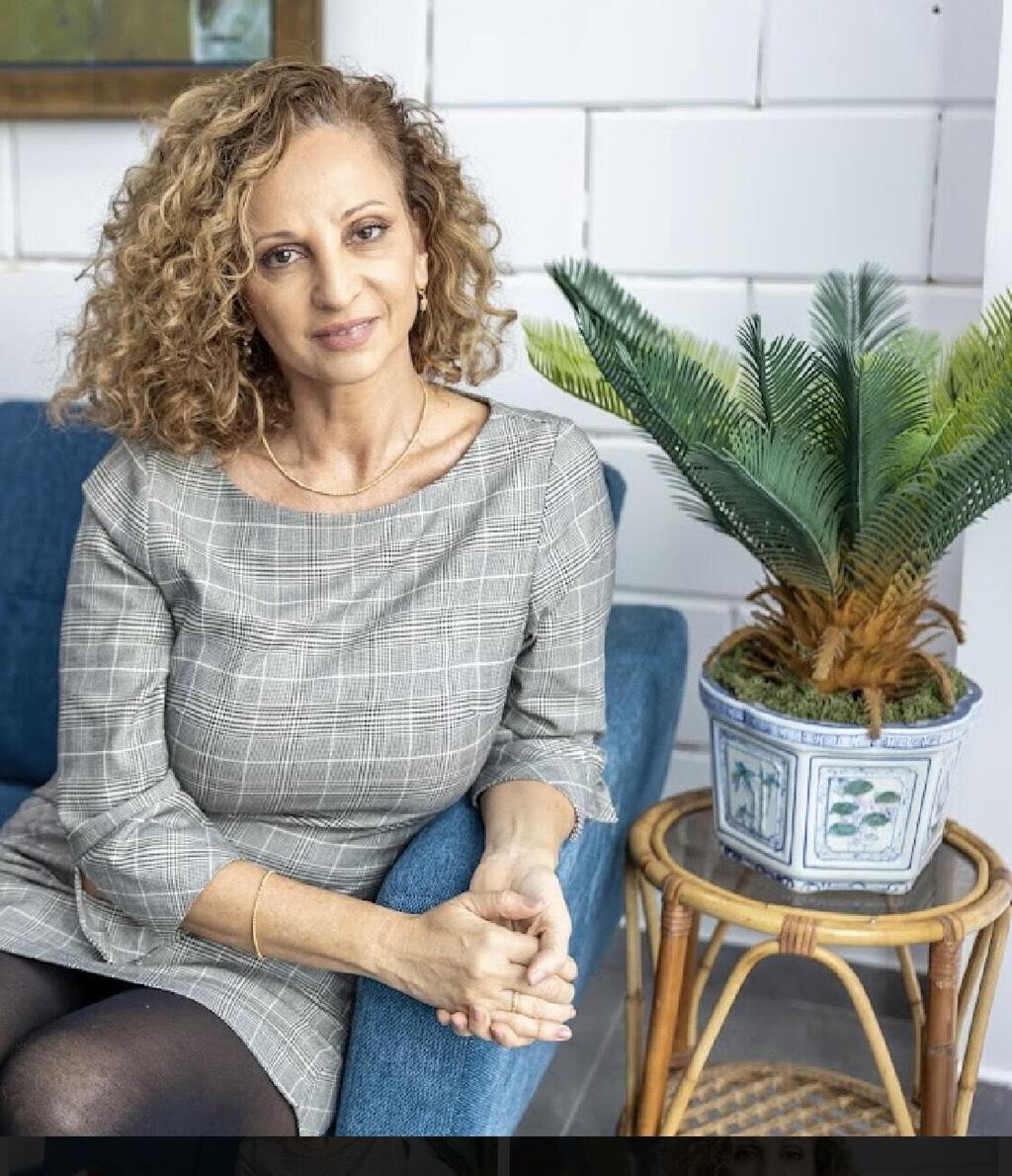“For years, sex just hurt. At some stage, I understood that it’s not supposed to hurt, that it’s not okay,” sex therapist and mother to a two-year-old boy, Avishag Zluf, from Pardes Hanna tells us. Zluf says there was no information available about pain during sex when she was young. The little literature there was suggested women should “compromise for the sake of a peaceful home.”
“I once read an interview about women’s pain during sex with a sex therapist who suggested that women should think of a song that they like and that it’ll soon be over. I felt I was having sex just to placate my partner. I felt ‘that’s what you have to do’. To make my partner feel loved, I shouldn’t disappoint him," says Avishag, 39.
She says her partners were not always understanding. "They would say, 'If you don’t want to have sex, at least go down on me, at least give me a hand job.' For years I thought that was what I was supposed to do. It took me a very long time to change the way I thought about it, to stop placating my partners and to not do anything my body doesn’t want to.“
Did that keep you away from being in relationships or prevent you from enjoying sex?
“No. I mostly kept it to myself. I didn’t tell my partners and it took time for me to admit the pain, even to myself. If I was dating, I’d make sure I wouldn’t see my partner at all during the three days of pain. Sometimes the pain was so bad that I couldn’t even put on underwear. I couldn’t have sex every day because I needed a break of a few days. I also made sure to keep away from men with large penises.
“Sex was usually about whether I was wet enough, if it was going to hurt, and how long it would go on for. I became creative about non-penetrative love-making. At some point, I just ran out of infections preventing me from having sex.”
In her search to treat the pain, Avishag found a Chinese therapist who asked her what happens during sex. “I’ll always remember what she said: 'Sex isn’t a place for bargaining and negotiation.’ I started saying no. I gradually found myself saying yes. I reconnected with my body and my own sexual pleasure. For years, sex had been reactionary – responding to what my partner wanted. I then started looking into what I wanted during sex – irrespective of my relationship situation.”
Did this help with the pain?
“The pain disappeared for a while, and then it came back. For me, the pain tells me that something has been unspoken. I tend to not speak up. I avoid conflict situations so as not to hurt anyone. I found myself crossing my own boundaries. I now deal with the issue on a daily basis.“
Did you ever get a medical diagnosis?
“I went to doctors who all said that there was nothing wrong with me. There’s a pain at the left side of the vagina opening, but they couldn’t identify anything. Physiotherapist told me there was some tension on the pelvic floor that needed massaging. Self-massage sessions involving both - deep focus and emotional awareness - did a lot to help.
“I found it hard to accept that I needed to be rescued by a doctor or by partner who would have to be an attentive lover. I realized that I needed to heal myself and that I’m the only one who knows what my body wants. I now teach massaging to other women.”
How have your partners taken it?
“It makes the whole process rather cumbersome. I’m not such a breezy, always-wet-and-available kind of girl. That said, I don’t place the responsibility on my partner. I have to communicate and say what I want and what I’m feeling. There are times when it’s very painful and times it isn’t.
“Hormones and the time of the month also play a part. During the first part of the cycle, at the estrogen stage, I’m wetter and supple, but it decreases during the progesterone stage. While I was pregnant, I couldn’t have penetrative sex at all. It was like a ring of pain. I listened to body when it was telling me no. It was annoying, but it was only for a certain time. I was glad when it was over.
“The pain has since become my gauge. I’ve learnt to stop, slow down, change what we’re doing and, most importantly, understand that it’s alright to stop. My feeling defective was the root of much of the drama. I kept thinking about how not to burden my partner with the problem, and that no one would want me like this anyway. I now realize that it’s my body and I’ve gotten rid of partners who couldn’t deal with it.”
Zlil Sabah, 28, from Kiryat Haim experienced vaginal pain during her very first sexual encounter. Unlike Avishag, Zlil was lucky enough to find a solution in only a few short months. “My husband was my first boyfriend. Sex hurt from the very beginning.”
“I thought it was supposed to hurt. People talk about how it hurts at the start. It didn’t get any better over the following month. Something wasn’t right. I asked for advice and recommendations in a women’s Facebook group. I was included into a secret Facebook group for women experiencing pain during sex. I suddenly had a whole community of women suffering from the very same thing.”
Then what happened?
“In the group, I received recommendations for specialists. I saw all kinds of gynecologists. Most were rather rude and dismissive. Some told me to drink a bit of wine or to just try and relax more. Thanks to the support in the Facebook group, I realized that wasn’t me - it’s them. I found five female gynecologists in the country who specialize in pain during sex. I made an appointment with Dr Ahinoam Lev-Sagie.
“I had to wait six months for my appointment. These six months were extremely painful. When I finally saw Dr Lev-Sagie, she diagnosed me with vaginal over-contraction - low level Vaginismus with secondary vulvar vestibulitis, meaning that the excessive contractions had caused a light infection in the nerves. She also explained that when the over-contraction stops, the vestibulitis would also dissipate. She sent me for physiotherapy, but I didn’t do all the treatment because I managed to fix it myself.”
How?
“Initial penetration was what caused most of the pain. Further pain came and went. My partner and I decided that come-what-may, the moment I experience even the slightest pain, we stop immediately. We hug and simply relax. We don’t try carrying on. We take a breather. It made things much easier for me and helped me stop associating sex with pain.
“I’d stop him just before penetration, take a few deep breaths and used guided imagery to relax the muscles. We did this for a year and a half. I had a physiotherapist appointment every six weeks. I can now say that I’ve been healed. It’s important for people to know that you can get rid of it. If it does come back, even if it’s chronic, it can be fixed and that sex can be pain-free.”
Your partner sounds amazing. I’m sure you’ve very appreciative
“Indeed. It upsets me to think that most women don’t stop when it hurts. That’s the heart of the problem. It’s disturbing to think that most women don’t get this kind of support from their partners. It was lovely to see women’s supportive partners, holding their hands in Dr Ahinoam’s waiting room.
“The partner is crucial for putting an end to the pain. For me, the pain was psychological. I didn’t have any nerve problems and the support I got at home helped me become cured. Women must understand that they have to be clear with their partners about listening to their needs. If partners aren’t on board, women shouldn’t be with them. No man’s worth that pain.”
Is it important for you to give hope to other women?
“Very much so. In the secret groups, I always write about how I’ve been cured, so that women know there’s light at the end of the tunnel. I’m always happy when women write to me and talk to me about it.”
Tamar Lerner, 39, is divorced and has an eleven-year-old son. She teaches yoga and yoga-therapy. She started experiencing pain years after becoming sexually active. “The pain only started after I got divorced. Six years ago, I developed a Candida, a vaginal yeast infection. It was really unpleasant. You can’t have sex. The pain made me push my partner away and close up.”
"The infection resurfaced even when I wasn’t sexually active. I realized it had nothing to do with the men I was dating, but that it was about me. It just became painful, regardless of the yeast infection. I stopped all the regular treatments and tried to see what I felt when, instead of concentrating on getting rid of the infection, I listened to my own body. I saw that the infection went away on its own, without pushing various substances into my body. I realized there was something I needed to listen to.“
What did you discover?
“Everything that happens in the body is related to our feelings and the body’s always talking. I just didn’t understand what it was saying. At first, I thought it was some kind of romantic rejection, that maybe my body was telling me that the partner wasn’t right for me. But then I had partners that I felt very good with and who were very attentive, and I still felt the pain because I wasn’t aware enough of my own body. During the COVID pandemic I did some sex workshops over Zoom, which aimed to familiarize me with my vagina, or ‘yoni’ as it’s known in Sanskrit.
“I then developed a relationship with my yoni. I started looking at it, loving it, started not being repulsed by it. I realized that I didn’t know it at all. I understand that I needed to be very mindful and that I have to be honest about it both to the men and when I’m pleasuring myself. Everything that enters me, even a tampon has to receive permission.
“I learned to separate – sometimes I want to and my vagina doesn’t. If the vagina says no, and I go ahead anyway, it instantly hurts and often an infection may well appear. I understand that it’s nothing medical and it’s not related to my partner. It’s about how aware I am of myself and of my own body.”
You did go to doctors though
“Yes, three times. One doctor said ‘Oh my goodness. What an infection! I could show this severe and very interesting case to my students.’ It was awful.“
How did your partners react?
“I was surprised to learn that lots of men don’t know anything about it at all. I’m talking about 40–50-year-olds who’ve been with lots of women and know nothing about penetrative pain. It just goes to show how many women don’t talk about it. It can’t be that none of the women they’d been with had experienced it. I was shocked to discover quite how silenced the whole matter is.
“Luckily, most of the men I’ve been with, have sensitive about it – although some seemed sensitive when we talked about it, but not in the heat of the moment, during the act itself. They penetrated and I didn’t get what was going on. It was all very confusing. Because my body showed all the signs of being ready, they hadn’t fully understood what I meant when I said it hurt. Men who are more emotionally developed can deal with it, but it’s hard. It requires a different kind of, non-mainstream, kind of sex.
“I need to love myself and accept myself as I am. I’m working on feeling more confident about what my body wants – both when I’m on my own and when I’m with a partner. When I accept who I am and come from a place that I love myself, then my partner can accept me the way I am. I‘ve no interest in someone who doesn’t accept me the way I am and can’t deal with it. “
How did you overcome the pain?
“I’ve learned to recognize my body’s different states. There’s a state known as ‘tenting’ when the vagina is ready for penetration. Even if I’m turned on and my body seems to want it, sometimes the vagina isn’t ready. ‘Tenting’ is when the vagina is truly open. It looks like a tent. The vagina opens up, softening up to ‘invite’ in the penis. When my partner and I learned to how to decipher when my vagina was ‘tenting’, he could enter me and it wouldn’t hurt.
“The first time I had sex that didn’t hurt, it was amazing! Although I’m very much aware of my own body and I feel connected to it, time and time again, I find myself not listening to it. I say ‘yes’ when I’m not really there. It’s very frustrating. I keep thinking about how many women this affects and how hard it is to say ‘no’ when your hormones are going wild and you think you want it.”
What’s going on with you now?
“I’m in a relationship with a man who’s very attentive to my needs and it all happens very slowly, at my pace. He doesn’t do anything I’m not ready for and he constantly asks me how I’m doing. Even with him though, I find myself saying ‘let’s go’ when I’m not ready. Then it hurts. It’s really complicated.
“There’s a conversation here about cultural templates and the societal contracts by which we live; the social roles of men and women. The norm is that I need to make it possible and he needs to penetrate. He needs to pleasure me. Although I know that all of this ‘needs to’ is nonsense, I sometimes find myself operating within these norms.”
Geoula Feldman, licensed couples and sex therapist, author of “Sex-o-logy: Screens and Masks. What Really Happens in the Bedroom” tells us: “I’ve been at the clinic for 17 years. Not a day goes by without my meeting a woman who tells me about pain during sex. It can be the vagina locking, prohibiting penetration or it can be pain at the moment of penetration.”
How do you start treatment for pain during sex?
“I first need to diagnose. The pain is a symptom. It represents something. It’s important to be checked by an empathetic doctor. Most of the women I see suffer from one of two things: Firstly vaginismus, which I call a ‘locked garden’. This is involuntary contraction at the vagina opening, which doesn’t allow for penetration. The second is vestibulitis – a nervous condition of excessive nerve ending at the vagina opening.
“I see a lot of young women who don’t have penetrative sex, don’t use tampons and don’t go to see a gynecologist for fear of the examination itself. Some women aren’t totally locked up but experience various types of pain. There’s a pain that’s only at the beginning, and then it passes. There’s pain that carries on through the whole sexual act. Some pain terminates as the sex finishes and some continues long after.
“Women who experience even a little pain during sex can gradually close up to the point of vaginismus. To solve the problem women first need to feel positively connected to their own bodies. This means learning to listen to the pain, observing the body and trying to understand which other parts of the body contract along with the vagina opening. I then look at the relationship between the body and the sexual organ.
“Throughout my whole career, I think I’ve only heard two women say that their sexual organ is okay or beautiful. Most women think it’s ugly, unaesthetic, that it secretes or that its shape is weird. Our culture makes women feel bad about their bodies. If a woman feels a high level of disgust or repulsion, we’ll work on lightening the emotional baggage related to her vagina. A lot of women’s fear of penetration comes from fear of the male sexual organ.”
What do you mean?
“Disorders surrounding sexual activity generally stem from fear. In the clinic, we have a model of the male and female sexual organs. I encourage women to look at the proportions. The female sexual organ is contracted and closed. The circumference of the male sexual organ is much larger. I’m often asked how it’s even supposed to get in. The vaginal opening is elastic. I can expand to up to 10cm, and then contract and close up again. If a baby can get out of there, a man’s sex organ, however large, can definitely get in.
“The contractions are often related to fear and anxieties. Our subconscious thinks we’re in some kind of danger and it closes the gates. We need to see where this fear comes from. Women sometimes say ‘I just think it’ll hurt’ because they’ve heard stories from friends or old wives’ tales about the hymen and bleeding. The fear can be caused by bad sexual experiences or by gynecological examinations.
“These fears can also be evoked by stern messages received when they were young about sexual women being cheap or being susceptible to rape. Women may also carry some other kind of sexual trauma. I never ask women if they’ve experienced such a trauma. I gently ask ‘Have you, or someone close to you ever experienced anything that would associate sex with distress’?
“There’s a broad spectrum of trauma. All women have experienced some kind of sexual harassment or something sexually inappropriate. This can manifest itself in fear and anxiety within a sexual relationship and would not allow the muscle to be sufficiently soft. We aim process these fears in our treatment.
“I want to hear what the vagina opening is telling us. What’s preventing it from reaching its full elasticity potential and how we can eliminate these obstacles. We can talk about the couple’s relationship dynamic – especially for women who develop the pain only with one particular partner. The body stores within itself things we can’t tell our partners or even ourselves. Maybe anger or lack of trust. A further reason for contraction can be a woman’s inability to define boundaries – women who try to placate their partners. The sexual organ can be the final hold-out that won’t cooperate with this placation – the only place that can say ‘no.'"
How do you make a treatment successful?
“I don’t start with the treatment until the woman tells me why she wants it. Most woman can enjoy being sexually touched on the exterior, reaching fabulous orgasms and don’t actually need penetration. I call it the freedom to experience our bodies’ full spectrum.
“After we eliminate the pain, women can have trouble-free sex. They say to me ‘is that it? It’s more fun doing other stuff.’ The most important thing is not to be governed by fears and anxieties. However, if women want children, penetrative sex is clearly the simplest and most natural way to do it.”
When do you include the partners in the treatment?
“Treatment involves practicing with the partner. We start translating everything the woman has understood about her emotional needs and her communication with her partner. Women often suffer from fear of abandonment or infidelity. In such cases, women must be clear that penetration is just one of many options.
“If the man is threatening to leave the woman, there’s no point in continuing the treatment. I sometimes tell my patients: ‘See how wise your body is. If your relationship is conditional on one single act, you never know what it’ll lead to.' We start practicing a gradual process of never reaching a situation where it hurts the woman. I advise couples to try to understand together in which positions the muscle is softer.
“Legitimizing that penetration doesn’t have to occur quickly if at all, relaxes the vagina opening so as to allow for pain-free sex. It can be very frustrating for couples when they move on from practicing on their own to practicing with each other. It can take anything from three months to up to a year. It depends on the symptoms and the level of fear.“
But the good news is that the pain is curable?
“In the vast majority of cases, yes. I don’t recall a case of pain that we couldn’t cure. The whole female experience is connected to pain: Eve was told in Genesis 3:16: ‘With painful labor you will give birth to children.' From hair removal to ear-piercing, women all to readily accept the pain in their lives. Society almost romanticizes this pain. It’s simply a mistake. The body doesn’t play the game and it gradually closes up.”
“Women sometimes come to me saying ‘I just don’t feel like it’ or ‘I don’t orgasm’. They obviously won’t feel like it if it hurts. Pain is the body’s way of saying stop. Stop and try to find a better way.”






